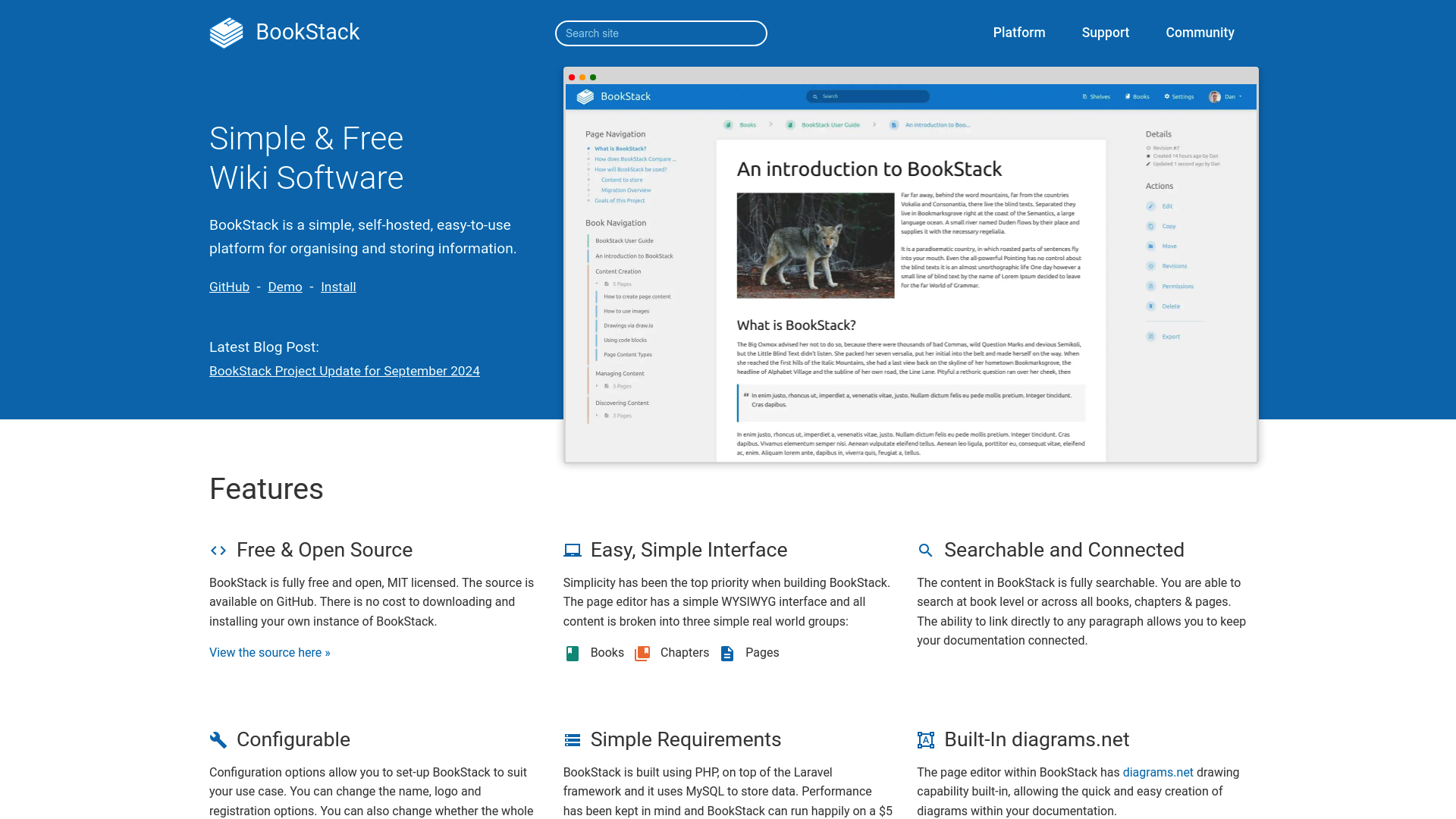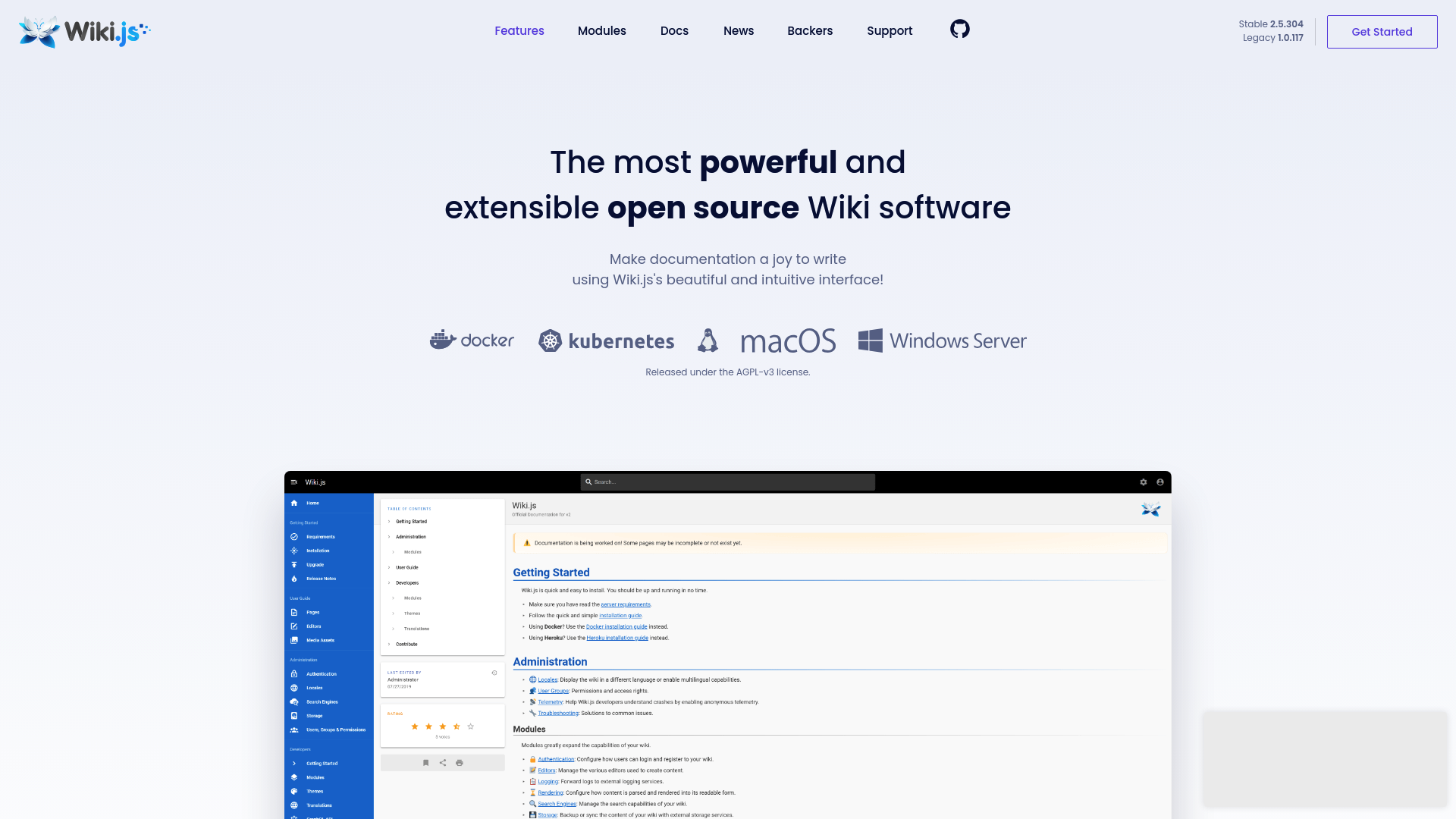2 Open Source Alternatives To CMS
The best Documentation tools similar to CMS
Bookstack stands out as a leading open-source alternative to CMS. For those seeking different features or workflows, we've curated a comprehensive list of CMS alternatives, each offering unique strengths.
Notable mentions in the CMS alternative space include: Wiki.js.
The CMS ecosystem primarily consists of Documentation solutions. Explore these alternatives to discover tools that align with your specific CMS-related requirements, whether you're looking for enhanced features, different user experiences, or specialized functionalities.

BookStack is an open-source, self-hosted platform designed to make organizing and storing information simple and efficient. Built with PHP and Laravel, it provides a user-friendly interface for creating and managing documentation or wiki content. BookStack is ideal for teams and individuals looking for a straightforward solution to document management without the complexities and costs associated with other platforms.
- Free & Open Source: BookStack is fully free and open-source, licensed under MIT. The source code is available on GitHub.
- Easy, Simple Interface: Features a WYSIWYG editor and organizes content into Books, Chapters, and Pages.
- Searchable and Connected: Fully searchable content with the ability to link to specific paragraphs.
- Configurable: Customizable options for name, logo, registration, and visibility settings.
- Simple Requirements: Built on PHP and Laravel, using MySQL for data storage. Can run on minimal server resources.
- Built-In diagrams.net: Integrated diagrams.net drawing capability for creating diagrams within documentation.
- Multi-Lingual: Supports multiple languages, thanks to community contributions.
- Optional Markdown Editor: Provides a markdown editor with live-preview functionality.
- Integrated Authentication: Supports various authentication methods including social providers and enterprise solutions like Okta, SAML2, and LDAP.
- Powerful Features: Includes cross-book sorting, page revisions, image management, and a robust role and permission system.
- Multi-Factor Authentication: MFA options like TOTP and static backup codes are built-in and can be enforced per role.
- Dark & Light Modes: Offers both light and dark themes, configurable at the user level.
BookStack is a versatile and powerful tool that simplifies the process of creating and managing documentation, making it accessible for users of all technical levels.

Wiki.js is a powerful and extensible open-source wiki software designed to make documentation a joy to write. Built on Node.js, it offers a beautiful and intuitive interface that simplifies the documentation process for teams of all sizes. Whether you want to host it yourself or deploy it on a cloud provider, Wiki.js provides the flexibility you need to get started quickly and efficiently.
- Easy Installation: Get started quickly with self-hosted or cloud-based installation options.
- Customizable: Tailor your wiki with a wide range of modules that can be turned on or off as needed.
- Authentication: Supports local, social, and enterprise authentication methods, including 2FA.
- Editors: Choose from Markdown, Visual Builder, Plain HTML, and more for content creation.
- Version Tracking: Keep track of changes with version history, compare versions, and export or branch off content.
- Localization: Available in multiple languages with native RTL support and multilingual content capabilities.
- Media Assets: Manage images, code highlighting, diagrams, math expressions, and media players with ease.
- Search: Utilize powerful search options including cloud search and Elasticsearch.
- Storage: Supports various storage options such as Git, enterprise cloud storage, and local/network storage.
- User Management: Manage users, groups, permissions, and page rules effortlessly.
- Themes: Customize your wiki's appearance with dark mode, custom themes, and the ability to inject custom CSS/JS.
In conclusion, Wiki.js is not just about being free; it’s about being open. It invites contributions from the community to add new features and squash bugs, making it a robust and reliable choice for any documentation needs.
Discover Open Source Alternatives to:
View alltableau
Tableau helps people see, understand, and act on data.
Airtable
Empower teams to create custom apps without coding.
Contentful
NewContentful acquires Ninetailed to boost AI-driven personalization.
Typeform
Customize your cookie settings for tailored content.
Notion
All-in-one workspace with AI integration.
1Password
Empower teams with secure access management.